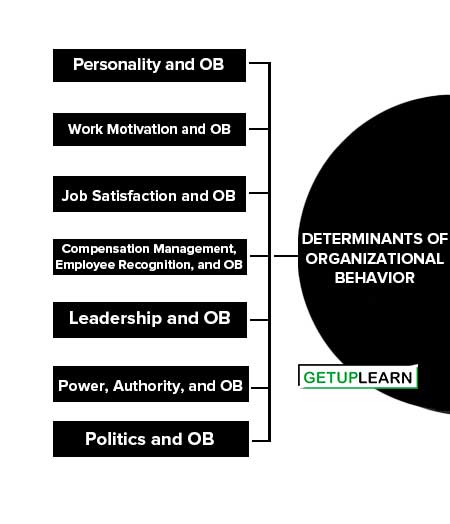Organizational Behavior is the study of individuals and group dynamics in any organization. When people interact in any organization, many factors/determinants play their roles in one or the other form. It is important to understand factors affecting organizational behavior, which is ultimately influenced by individuals and group dynamics.
People from different cultures and backgrounds interact with each other and work together to accomplish common goals and objectives. OB helps to understand the behavior in organizations and develop competencies in foreseeing how people behave in the workplace.
The knowledge regarding behavior also helps in controlling those behaviors which are not giving fruitful results to the organization concerned. Further, OB also provides strategies for the effective management of difficulties, differences, and conflicts.
Table of Contents
Determinants of Organizational Behavior
The determinants of organizational behavior are explained below:
- Personality and OB
- Work Motivation and OB
- Job Satisfaction and OB
- Compensation Management, Employee Recognition, and OB
- Leadership and OB
- Power, Authority, and OB
- Politics and OB

Personality and OB
Personality refers to qualities, traits, competencies, skills, and patterns of behavior of an individual in a particular situation. On the basis of characteristics, certain inferences can be drawn from the behavior of the individual. An example could be aggressiveness or politeness.
Work Motivation and OB
Motivation is the drive that is aimed to achieve the goal described. The process starts with physiological and psychological needs.
The behavior of the individual is affected by the motivation that regulates the flow of potential energy from the reservoir and channelizes this energy to achieve the objectives in a particular behavior. Work motivation is closely linked with the overall performance of workers and hence organizational performance.
Job Satisfaction and OB
Job satisfaction refers to an individual‘s overall attitude towards his job resulting from the appraisal of his job or job experience. It is regarded as the general attitude with specific dimensions of the job such as compensation, the work itself, promotion opportunities, the scope of growth, co-workers, etc.
An attitude of job satisfaction is linked with a broader approach to improving job design, quality of work life, and work performance.
Compensation Management, Employee Recognition, and OB
Compensation Management pertains to how fairly pay benefits are distributed. Employee recognition is a communication tool that reinforces and rewards the most important outcomes created by people for the organization.
When any organization recognizes people effectively, the actions and behaviors of the workforce are positive for the organization itself. Therefore effective employee recognition system and compensation management can become a powerful tool to generate desired behavior of individuals.
Leadership and OB
Leadership plays a dominant role in any organization. Leadership is engaged in managing an organization on the basis of the individual and situational qualities of managers.
Power is the ability to make desired outcomes happen in organizations concerned to influence others. Authority is the right to command by virtue of the position held by the individual and the responsibilities entrusted to him to perform the tasks. Power can be enhanced by the following measures:
- Expanding the internal and external networks.
- Enhancing one‘s skills and knowledge.
- Building expertise through additional training programs.
Associating with professionals and experts and keeping abreast of new technology to ensure advancements.
- Exercising political astuteness
- Improving interpersonal skills.
Politics and OB
Politics in an organization tends to activities/behavior that is not required as part of one‘s formal role in the organization, but that influence the organization and the workforce within the organization. It involves Legitimate Political Behavior‘ concerned with normal everyday politics including complaining and obstructing.
Illegitimate Political Behavior relates to violations of the implied rules of the game i.e. indulging in protest, whistle-blowing, etc. Limited resources also lead to political behaviors, Blaming others‖ or fixing responsibility also accounts for politics.
The lack of an objective standard discourages reality and shows facts far away from the truth. Organizational politics may give ill effects in the form of:
- Job dissatisfaction
- Increased stress and anxiety
- Increased employee turnover
Running or managing a setup involves determinants of organizational behavior, which are to be kept in mind and followed while performing various tasks so that goals can be achieved effectively and efficiently. There is a focus on leadership, power and authority, employee recognition, compensation management, and work motivation so as to develop competencies in foreseeing how people are likely to behave.
This knowledge may help in controlling those behaviors that are not befitting the objectives of the organizations and become the constraint in the effective execution of policies, procedures, and practices.
FAQs Section
What are the determinants of organizational behavior?
These are the determinants of organizational behavior:
1. Personality and OB
2. Work Motivation and OB
3. Job Satisfaction and OB
4. Compensation Management, Employee Recognition, and OB
5. Leadership and OB
6. Power, Authority, and OB
7. Politics and OB.
